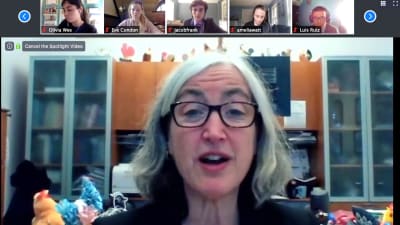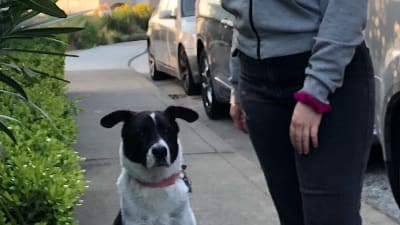Three conversations, three blockbuster women leaders
Last week at the end of Morning Meeting one of our students offered these words from Charlotte Brontë’s Jane Eyre:
I can live alone, if self-respect, and circumstances require me so to do. I need not sell my soul to buy bliss. I have an inward treasure born with me, which can keep me alive if all extraneous delights should be withheld, or offered only at a price I cannot afford to give.
Brontë was imagining a very different world and a very different set of problems when she wrote those words. But they are presciently helpful in our quarantined era. Whether they have read Jane Eyre or not, our students are definitely taking its protagonist’s advice to heart.
Brontë is also a fitting way to start a blog post focusing on three strong women leaders, each of whom met (virtually) with our students recently.
Our first virtual meeting was a memorable one: Christy Goldfuss, the former Chair of the White House Council on Environmental Quality (CEQ). Goldfuss was the final speaker in our climate change case study (which also included George W. Bush CEQ official Khaury Cauthen and Obama-era CEQ official Sydney Bopp). The conversation was wide-ranging and touched several key leadership themes. Student questions included how best to connect with those who deny climate change, the value of the “Green New Deal,” the connection between the current pandemic and the climate, and the ethical balance involved in Keystone Pipeline policymaking.
Goldfuss’ session also afforded our students a behind-the-scenes look at a former White House leader’s personal life: she took the call in her young daughter’s bedroom (which was covered in artwork). We even got to meet her daughter, who wandered into view midway through our discussion. These small moments offer subtle leadership insights that other semester cohorts have never experienced.
Most of the last two weeks has been focused on our collaborative policy document capstone (the “CPD,” as our students call it). The CPD is one of SEGL’s most difficult challenges. Each SEGL cohort must select a current international crisis, thoroughly research that crisis, and collaboratively craft a 40-page scholarly document which the cohort presents and defends in front of real-world policymakers.
Spring 2020 chose the United States’ response to future pandemics. (This was an understandable shift from the group’s pre-Spring Break selection: the Kashmir conflict between India and Pakistan.) After making this decision, the students split into five sub-groups, each with a different area of expertise.
They then spent a morning in the (virtual) George Washington University main library, with access to the University’s resources. David Ettinger (the top international relations/political science research librarian at GW), who has been a student favorite since our first semester, started with an entertaining orientation session that enabled the students to use the myriad databases in the GW system (this is also good preparation for undergraduate life!). The students soon made efficient work of his expertise.
The next stop in the CPD process is writing “memos,” or short documents in which each group summarizes their initial findings and puts together draft recommendations. Each group then presented its memo to a faculty “Review Panel,” made up of four faculty members playing the roles of important stakeholders. Over the course of about three hours, the panel grilled each group, asking tough questions and picking over every small detail. Each group received pointed criticism – the way a Supreme Court Justice, Member of Congress, or dissertation committee member might deliver it – which pointed toward rough drafts and final presentations.
The process also includes direct conversations with experts. This semester, our cohort met with two.
First, we spent an hour with Dr. Anne Schuchat, the Principal Deputy Director of the Centers for Disease Control. It would be difficult to find someone better positioned to offer advice to our students: Dr. Schuchat spent eight months as Acting Director of the CDC and is an expert on respiratory diseases like COVID-19. Her session included sage advice on making challenging leadership decisions, thoughtful reflections on the Trump Administration’s handling of the current crisis, and answers to many informed student questions. (Like Goldfuss, Schuchat offered us a hint of insight into her personal life: over 20 chickens of all shapes and sizes sat silently behind her, providing a joyful juxtaposition to her professional demeanor – and a small unsolved mystery!)
We then met with Dr. Ana Marie Cauce, the President of the University of Washington. The UW is playing a leading role in responding to the COVID-19 epidemic (for example, the UW’s Institute for Health Metrics and Evaluation is the leading source for COVID-19 projections, and several University professors are leading key pandemic studies). And, because the Seattle area was “ground zero” for the U.S., President Cauce has had to make a number of leadership decisions before her peers around the country. The meeting with Cauce helped students better understand how academia can help solve societal problems, and gave new insight into the ethical decisions leaders have to make in crisis situations. As one student asked, “How do you make the best decisions when stakes are high and information is imperfect?” (Cauce too offered a bit of unexpected personal insight when one of her cats leapt up behind her and began peering at us through the screen!)
After compiling their research for several days, the students created rough drafts that our faculty critiqued in writing. After further discussion, disagreement, research, and revision, they will be ready to publish and present! Each semester we try to meet with on-the-ground policymakers who have the ability to incorporate our students’ ideas into actual policy. With whom will we meet this spring? Stay tuned!
Meanwhile, we’re continuing our community-building outside of the classroom. We’ve asked students to continue with our chore and exercise programs, and to post photos of that work on our internal server. Those photos are always great fun to review; we’ve included a few of our favorites below.
One more thought: Just after the quotation that starts this entry, Brontë adds the following line:
Strong wind, earthquake-shock, and fire may pass by: but I shall follow the guiding of that still small voice which interprets the dictates of conscience.
We may be sharing virtual space together, but there is still every opportunity for our students to turn their still-small voices of conscience into clarion cannons. That has always been our work at SEGL, and the reason we continue to be hopeful and purposeful.
































